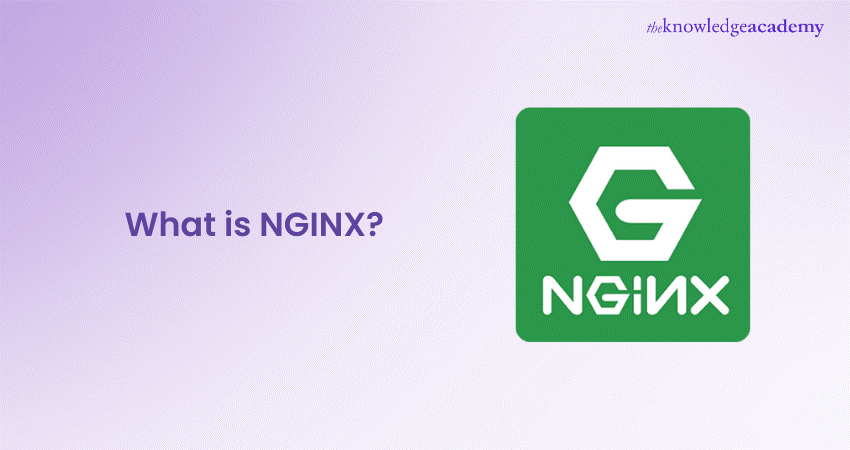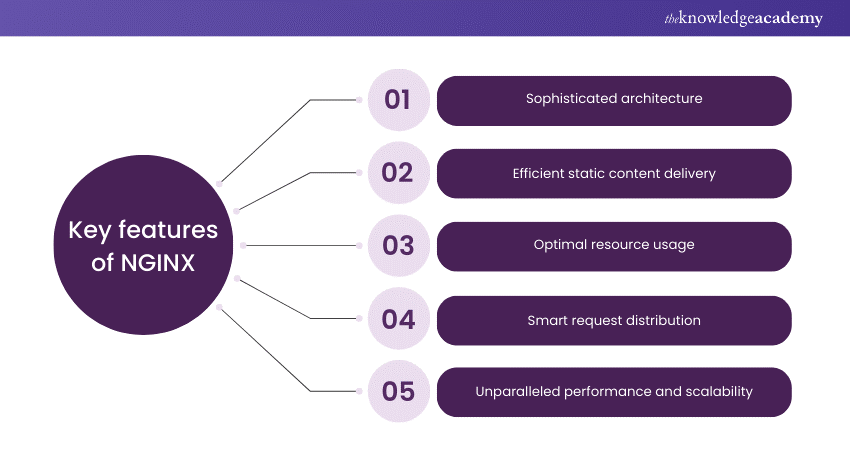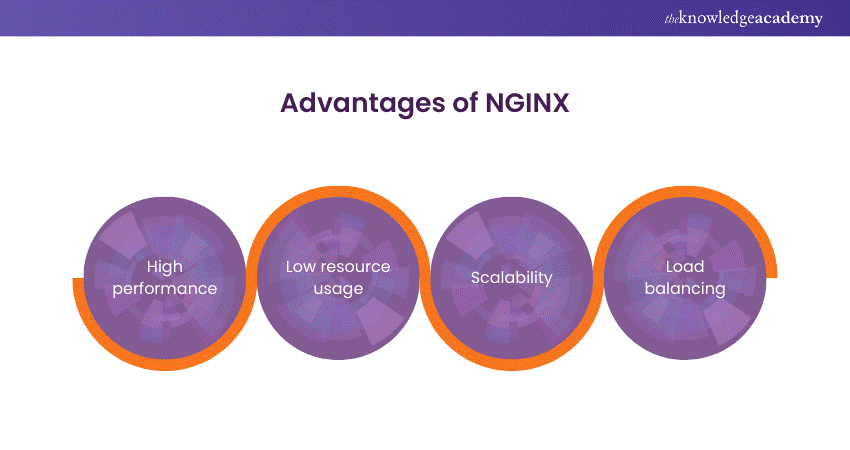We may not have the course you’re looking for. If you enquire or give us a call on +420 210012971 and speak to our training experts, we may still be able to help with your training requirements.
Training Outcomes Within Your Budget!
We ensure quality, budget-alignment, and timely delivery by our expert instructors.

When it comes to web hosting, finding a server solution that offers both speed and scalability is a huge challenge. Conventional servers often face difficulties handling a large number of simultaneous connections efficiently. This is where NGINX steps in as a robust solution. But "What is NGINX?" and how does it work?
If you want to learn What NGINX is and how it works, this blog is for you. Let’s dive in to learn more!
Table of Contents
1) Understanding NGINX
2) How does NGINX work?
3) Advantages of NGINX
4) Disadvantages of NGINX
5) Difference between NGINX and Apache usage stats
6) Conclusion
Understanding NGINX
NGINX, a powerful open-source software, serves as a versatile web server and more. Pronounced "engine-x," it excels in handling numerous simultaneous connections, making it a preferred choice for high-traffic websites.
NGINX's unique asynchronous, event-driven architecture allows for efficient management of connections, ensuring optimal performance. Whether functioning as a web server or reverse proxy, its ability to swiftly serve static content and distribute incoming requests to backend servers sets it apart in the web hosting landscape.
How does NGINX work?
In this section, we will explore how NGINX works, along with its key features. Let's explore them below:

1) Sophisticated architecture: NGINX operates on an advanced asynchronous, event-driven architecture. It handles tasks efficiently, allowing for a seamless and rapid response to many simultaneous connections.
2) Efficient static content delivery: As a web server, NGINX stands out in rapidly delivering static content. By efficiently managing multiple connections concurrently, it ensures swift access to static files, contributing to a faster user experience.
3) Optimal resource usage: One of NGINX's strengths lies in its ability to operate with minimal resource usage. Its asynchronous nature enables it to handle numerous connections without putting a strain on system resources, making it an ideal choice for scenarios with high traffic.
4) Smart request distribution: NGINX distributes incoming requests to backend servers as a reverse proxy. This process optimises the overall response times, ensuring the workload is evenly distributed and preventing any single server from being overwhelmed.
5) Unparalleled performance and scalability: NGINX's unique approach to handling connections and requests showcases its capability to deliver outstanding performance and scalability. Whether it's serving static content swiftly or efficiently managing a surge in traffic, NGINX proves to be a valuable asset in the dynamic landscape of web hosting.
Advantages of NGINX
From high performance to scalability, NGINX has many advantages. Let's explore some of them below:

1) High performance: NGINX is renowned for its exceptional speed, ensuring the swift delivery of static content to users. This attribute is critical for enhancing user experience and reducing webpage load times.
2) Low resource usage: Leveraging an asynchronous architecture, NGINX efficiently handles a substantial number of connections with minimal memory usage. This frugal resource approach makes it an economical and efficient choice for various hosting scenarios.
3) Scalability: NGINX seamlessly adapts to growing web traffic, making it a preferred choice for websites anticipating expansion. Its ability to handle increasing loads ensures consistent performance even during heightened demand.
4) Load balancing: Functioning as a reliable load balancer, NGINX efficiently distributes incoming requests among multiple servers. This not only prevents overloading but also ensures optimal utilisation of resources, contributing to a more stable and responsive web environment.
Excel in web server administration with our Nginx Web Server Administration Training – Sign up now!
Disadvantages of NGINX
While NGINX boasts numerous advantages, it's essential to consider potential drawbacks:
1) Complex configuration: Some users find NGINX's configuration more intricate than that of other web servers. Configuring it for specific requirements may pose challenges for those unfamiliar with its setup.
2) Limited native dynamic content handling: While excelling at serving static content, NGINX may require additional configurations for optimal dynamic content handling. This additional setup can be perceived as a disadvantage for users seeking a more straightforward solution.
Understanding these potential drawbacks allows users to weigh the pros and cons when deciding whether NGINX fits their web hosting needs.
Difference between NGINX and Apache usage stats
Comparing the usage statistics of Apache vs NGINX sheds light on the distinctive features of these two prominent web servers:
1) Market share: Apache holds a larger market share in terms of active websites. On the other hand, NGINX excels in handling a higher percentage of busy sites with heavy traffic.
2) Concurrency handling: NGINX is renowned for its superior concurrency handling, making it more efficient in scenarios with numerous simultaneous connections. On the contrary, Apache tends to use a thread-based approach.
3) Resource usage: NGINX's event-driven architecture allows for lower resource usage, making it lighter than Apache, which typically uses more system resources.
4) Configuration: Apache's configuration is often considered more user-friendly, attracting those who prefer a simpler setup. In contrast, NGINX's configuration may be perceived as more complex but provides fine-grained control and optimisation opportunities.
Understanding these differences in usage statistics can guide the selection of the most suitable web server based on specific project requirements and preferences.
Enhance your proficiency in web server management with our Apache Web Server Training – Sign up now!
Conclusion
We hope you read and understand "What is NGINX?" and how it works. It stands out as a powerful web server known for high performance and scalability. Its asynchronous architecture ensures efficient handling of simultaneous connections. While offering advantages like low resource usage and smart load balancing, users should consider potential drawbacks, such as complex configuration. Ultimately, NGINX is a valuable choice for diverse web hosting needs.
Master web server optimisation with our NGINX Training – Sign up today!
Frequently Asked Questions

NGINX Plus is a commercial variant known for advanced features, including improved load balancing, monitoring tools, and continuous customer support. It caters specifically to organisations managing high-traffic websites or applications, providing enhanced capabilities and dedicated support for optimal performance and reliability.

NGINX is frequently employed as a reverse proxy and load balancer for backend servers. Its role involves efficiently distributing incoming requests and enhancing overall system performance. This utilisation makes NGINX a popular choice for optimising the backend infrastructure of websites and applications.

The Knowledge Academy takes global learning to new heights, offering over 30,000 online courses across 490+ locations in 220 countries. This expansive reach ensures accessibility and convenience for learners worldwide.
Alongside our diverse Online Course Catalogue, encompassing 17 major categories, we go the extra mile by providing a plethora of free educational Online Resources like News updates, Blogs, videos, webinars, and interview questions. Tailoring learning experiences further, professionals can maximise value with customisable Course Bundles of TKA.

The Knowledge Academy’s Knowledge Pass, a prepaid voucher, adds another layer of flexibility, allowing course bookings over a 12-month period. Join us on a journey where education knows no bounds.

The Knowledge Academy offers various IT Support and Solution Training, including NGINX Training, Nginx Web Server Administration Training, and Ubuntu Linux Server Administration Training. These courses cater to different skill levels, providing comprehensive insights into IT Infrastructure & Networking methodologies.
Our IT Infrastructure & Networking Blogs cover a range of topics related to NGINX, offering valuable resources, best practices, and industry insights. Whether you are a beginner or looking to advance your Nginx Web Server Administration skills, The Knowledge Academy's diverse courses and informative blogs have you covered.







 Top Rated Course
Top Rated Course




 If you wish to make any changes to your course, please
If you wish to make any changes to your course, please


